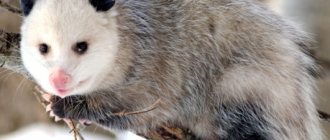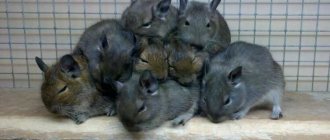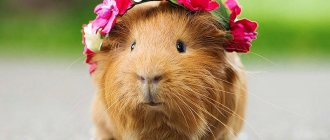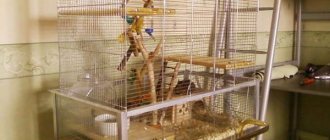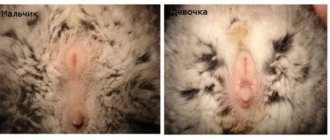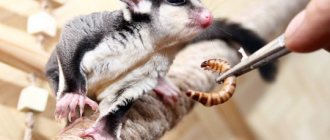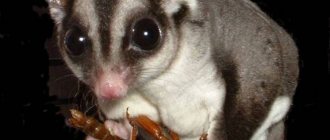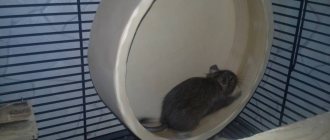- Reports and messages
- Animals
- Flying squirrel
The flying squirrel is a record holder for long jumping and lives throughout Eurasia.
Appearance of the animal. It is very similar to an ordinary squirrel, has a small muzzle, large black eyes that help it see well in the dark), small rounded ears and silver-colored fur with a reddish tint. The flying squirrel has a body length of 18 to 20 cm, the length of the tail is slightly shorter than the size of the body and ranges from 11 to 13 cm. The weight of the animal reaches 200 grams. The main difference between a flying squirrel and an ordinary squirrel is the absence of tufts on its ears and the presence of membranes that are located between its legs, with the help of which it makes its jumps. When jumping, the flying squirrel presses its hind legs towards its body, the front legs (which are shorter than the hind legs and have curved claws) are spread to the side. The length of the jump can reach sixty meters. Habitats and behavioral characteristics. Countries where flying squirrels live: Russia, Finland, Estonia, Latvia, Mongolia, North America, Korea, Canada, China. It can be found in the taiga and mixed forests, preferring the crowns of forest trees, where you can find alder, birch and hazel. The animal prefers a nocturnal lifestyle, carefully listening to extraneous sounds so as not to fall into the clutches of a predator, and at dawn it returns to its hollow, very playful, with an excellent camouflage color. In the summer they lead a solitary lifestyle; in the cold weather they gather in groups, the number of which reaches up to 23 individuals. Animals communicate with each other by chirping and report danger with loud squeaks.
A few facts about the flying squirrel:
1. For the house, choose hollows that are at a height of at least 3 meters from the ground. 2. Food: tree buds, bark of young branches, pine needles, nuts, mushrooms, alder and birch catkins, seeds, spiders, butterflies, bird eggs. They are preparing supplies for the winter. 3. The animal does not hibernate in winter, but at temperatures below 40 degrees it can go into short-term hibernation. 4. Enemies of squirrels: martens, weasels, sable, falcon, eagle, goshawk, lynx. 5. Lifespan in the natural environment ranges from 5 to 10 years. 6. There is a species of flying squirrel that can jump a hundred meters in length.
Reproduction. The animals live in pairs, the female brings offspring up to twice a year. Mating season occurs in the last winter month. The cub is carried for one month. Baby squirrels are born helpless and blind, but after the fortieth day of life, thanks to their rapid development, they can make jumps 10-20 meters long; during the first jumps, the baby is taught by showing an example. If the baby falls, he is returned back to the hollow. For two months, the mother takes care of her offspring and feeds them with rich milk. The babies stay with their mother until next spring.
The flying squirrel is not critically endangered. Due to its fragile fur, it is not of interest to humans; it is hunted as entertainment, but thanks to its good camouflage, it is not easy to notice the animal. A threat to existence may be the reduction of forests where flying squirrels live.
Description of the animal
A description and photo of a flying squirrel helps to get an idea of the animal. The individual belongs to the Rodents order and the Squirrel family. She is the only representative of the Flying Squirrel subfamily. The history of the origin of the name suggests that the animal received it due to its ability to overcome a fairly long distance from tree to tree. This is accomplished by a thick fold of skin connecting the front and hind legs.
During a jump, the squirrel literally floats above the ground, very rarely falls and is able to control its movements, eliminating the possibility of damage to its limbs. It is these skin folds that distinguish the flying squirrel from an ordinary squirrel and make it interesting for children and adults. Many people say that when the fold is straightened, a kind of wing is formed. The body of the individual is small, reaching 21 cm in length, if you do not take into account the tail. This mobile part of the body reaches 12 cm, has a flat shape and is covered with thick hair of different shades of brown and gray.
The entire body of the animal is also covered with thick hair. There may be stripes or small spots of black on the back, but often such signs are absent. The squirrel lives in different parts of the planet. Most often it can be found in Japan, Australia, New Guinea and Indonesia, as well as in many regions of Russia. She prefers to live not in coniferous forests , but in deciduous ones, since they facilitate movement and reduce the likelihood of injury when jumping long distances.
Experts today count about 10 species of flying squirrels, with 7 species living in Russia. In most cases, representatives of the family can be found in Siberia, Sakhalin and other regions. Usually a word is attached to the name of the animal, which indicates the area.
It is worth noting that the tail of a flying squirrel is always slightly lighter than the main shade of the coat. That is why it seems very fluffy and large, because the length is often almost comparable to the size of the body. If you see a squirrel during its famous jump, it may seem that the animal is quite large. The color of the fur on the belly is also different, and the undercoat in this area is softer and denser.
Appearance of a flying squirrel
The flying squirrel is similar in appearance to a squirrel, but has a smaller body and tail. The length of the animal is from 12 to 23 cm, weight is about 170 g. On the round, blunt-nosed head there are short ears without tassels and large convex black eyes. The thick silky fur on the top of the body is silver-gray, often with a brown tint, on the belly it is white with yellowish tint.
The main thing that distinguishes a flying squirrel from a squirrel is the presence of a skin membrane located between the hind and forelimbs, which serves for planning during flight. During a jump, when the squirrel spreads its paws to the sides, this membrane stretches, its tension and the position of the front paws set the direction of flight. The tail is used for stabilization in flight and acts as a brake when landing on a tree.
Nutrition and lifestyle
If you study information about the flying squirrel, you will find out that individuals are predominantly nocturnal. The surrounding world is dangerous for a small animal, so it feels more confident at night. It is important to remember that the animal is active at any time of the year and spends most of its life searching for food. Only young individuals, sometimes females, come out during the daytime, but such behavior is not typical for them.
The character of the animal is quite calm; flying squirrels do not defend their territory and do not attack other mammals. Lactating females can show aggression to protect their offspring, but they do this only under compulsion. Squirrels do not build nests; they prefer to build them in natural tree hollows, just like ordinary individuals. They spend most of their time in trees and rarely come down to the ground.
Scientists note that when there is a lack of food, many flying squirrels leave their nests and travel quite long distances. They remember the route used to search for food well and try not to deviate from it. Animals are herbivores.
Their diet is based on the following food:
- thin young bark of aspen, maple or willow;
- birch buds, pine seeds;
- young pine or spruce needles;
- birch and alder earrings.
The latter are considered the most preferred food for the flying squirrel. The squirrel not only consumes these parts of the tree, but also actively stores them for the winter, since the content of nutrients in them is higher than in other parts of the trees. Experts were unable to determine how much food the flying squirrel needs for the winter, but it was noted that the animal tries to make the maximum supply, since after the onset of cold weather it does not leave the hollow.
Individuals do not hibernate, but their activity decreases sharply, which is associated with the need to save energy and fat reserves. Some members of the family cannot survive the winter and die when cold weather sets in, since it is not always possible to make a sufficient supply of food.
In some regions, in the absence of usual food, flying squirrels can eat chicks in nests. This fact has not been confirmed, but several cases have been recorded. Regardless of what the flying squirrel eats, experts suggest that it can adapt to different conditions.
Flying squirrel lifestyle
The habitat of flying squirrels is mixed and deciduous forests, less often coniferous ones. They mainly lead a nocturnal and twilight lifestyle. Flying squirrels are active all year round; only on frosty days do they sit out in the nest, feeding on supplies stored for future use.
They spend most of their lives in trees, rarely descending to the ground. Nests are built in ready-made hollows left over from woodpeckers, magpies and squirrels. Sometimes it happens that flying squirrels settle in birdhouses.
The nests are covered with moss, dry grass, and lichen. Flying squirrels are non-aggressive; often two individuals can live in one nest. While awake, they search for food. Flying squirrels feed on plant foods - seeds, buds, shoot tips, berries, and mushrooms. They especially love birch and alder catkins, which they prudently put in a hollow, making supplies for the winter.
- Essay about a dog (my favorite animal) 5th grade
Once a year, the female gives birth to 2–4 naked and blind cubs, which by the 50th day are able to glide and become independent. The enemies of flying squirrels are large owls, martens, and sables. Life expectancy is approximately 5 years; in captivity, animals live twice as long.
Reproduction and population
The squirrel begins to reproduce at an early age, since its life expectancy in natural conditions does not exceed 5 years. Such a short cycle is associated with many natural enemies that destroy flying squirrels. Owls are considered the most dangerous pest. They are the ones who hunt small animals at night. Less commonly, individuals become prey for marten or sable. The reproductive characteristics of members of the family have not been sufficiently studied:
- It is known that the mating season begins around March.
- Gestation of the cubs lasts no more than 5 weeks.
- One litter can have from 2 to 4 squirrels. The female gives birth only once a year.
- Babies are born without hair, as well as with closed eyes, which open only on the 15th day of life.
- After 5 weeks, the squirrels begin to hunt on their own, trying to glide from tree to tree. By the 50th day of life, they become completely independent and are ready to leave their mother.
Today, the number of representatives of the family is very small, so hunting them is strictly prohibited. In some regions of Russia, animals are listed in the Red Book. Despite the beauty of fur, it is not valued because it cannot be used in the manufacture of various products.
In some areas, people protect animals and try to prevent their destruction. However, there is information about the independence of flying squirrels. The animals are excellent at avoiding encounters with enemies, try not to leave the hollow during the daytime, and move quickly at night. An important and necessary technique is camouflage on a tree. Due to its color, the animal can almost completely blend in with the trunks of many trees.
If a flying squirrel sees a person, it climbs to the top of a tree, presses tightly against it and does not move until the danger disappears. But some individuals are very trusting and do not run away from people. This is rare, only in secluded forests where the animal feels safe. It was this calmness that allowed man to get close to flying squirrels and keep them at home.
Message about flying squirrel 4th grade
Briefly about the flying squirrel: it is a small rodent of the squirrel family.
The flying squirrel looks very much like an ordinary squirrel - the same small muzzle, expressive black eyes, short legs with sharp nails, a bushy tail, rounded ears, although without tassels. The fur is delicate and soft with a silver color and reddish hues.
These animals are very small. Body length is 18-20 cm, tail up to 13 cm. The weight of the animal is also small, only 200 grams. The main distinguishing feature of flying squirrels is the leather membrane between the front and hind legs. It helps to fly, acting as a parachute. When a flying squirrel makes a jump, it presses its hind legs to its body, spreads its front legs to the sides and straightens the membrane. So she can glide from one tree to another, covering a distance of 50-60 m.
Where does the flying squirrel live?
These animals live in Finland, Latvia, Estonia, Mongolia, Russia, China and Korea. She is attracted to mixed forests and taiga. The flying squirrel prefers to settle on hazel, alder, birch and 5 other deciduous trees.
- Short stories about dogs from life are funny and interesting
Habits and reproduction
This playful and agile animal is predominantly nocturnal. The flying squirrel is well camouflaged. She prefers to settle at a height of at least 3 m from the ground. Although the animal does not hibernate in winter, in severe frosts it does not leave its hollow and feeds on its summer supplies. In its natural environment, its enemies are sable, marten, falcon, weasel and lynx.
Flying squirrels live in pairs all their lives. The female breeds offspring 2 times a year. For one litter, 2-4 blind babies are born. After a month, they can already independently jump from tree to tree.
The lifespan of a flying squirrel is from 5 to 10 years.
What does a flying squirrel eat?
It feeds on pine needles, buds of deciduous trees, pine nuts, bark of young shoots, berries, and mushrooms. But the animal’s favorite delicacy is birch and alder catkins.
Interesting things about the flying squirrel
- The flying squirrel does not fly in the literal sense of the word. She plans in the air, moving from one tree to another.
- It can cover a distance of up to 50 m. Scientists were able to record the animal’s maximum flight of 90 m.
- The flying squirrel is a very friendly animal. She can allow other representatives of the fauna of her species to “visit” her nest.
- During the summer-autumn season, the squirrel collects about 20,000 nuts for the winter.
- In captivity they are practically impossible to meet. In order to maintain them, it is necessary to have vast territories in your possession that would allow flying squirrels to fly.
We hope that the report on the flying squirrel helped you prepare for the lesson. You can leave your story about the flying squirrel using the comment form below.
- Reports and messages
- Animals
- Flying squirrel
The flying squirrel is a record holder for long jumping and lives throughout Eurasia. Appearance of the animal. It is very similar to an ordinary squirrel, has a small muzzle, large black eyes that help it see well in the dark), small rounded ears and silver-colored fur with a reddish tint. The flying squirrel has a body length of 18 to 20 cm, the length of the tail is slightly shorter than the size of the body and ranges from 11 to 13 cm. The weight of the animal reaches 200 grams. The main difference between a flying squirrel and an ordinary squirrel is the absence of tufts on its ears and the presence of membranes that are located between its legs, with the help of which it makes its jumps. When jumping, the flying squirrel presses its hind legs towards its body, the front legs (which are shorter than the hind legs and have curved claws) are spread to the side. The length of the jump can reach sixty meters.
Habitats and behavioral characteristics. Countries where flying squirrels live: Russia, Finland, Estonia, Latvia, Mongolia, North America, Korea, Canada, China. It can be found in the taiga and mixed forests, preferring the crowns of forest trees, where you can find alder, birch and hazel. The animal prefers a nocturnal lifestyle, carefully listening to extraneous sounds so as not to fall into the clutches of a predator, and at dawn it returns to its hollow, very playful, with an excellent camouflage color. In the summer they lead a solitary lifestyle; in the cold weather they gather in groups, the number of which reaches up to 23 individuals. Animals communicate with each other by chirping and report danger with loud squeaks.
A few facts about the flying squirrel:
Reproduction. The animals live in pairs, the female brings offspring up to twice a year. Mating season occurs in the last winter month. The cub is carried for one month. Baby squirrels are born helpless and blind, but after the fortieth day of life, thanks to their rapid development, they can make jumps 10-20 meters long; during the first jumps, the baby is taught by showing an example. If the baby falls, he is returned back to the hollow. For two months, the mother takes care of her offspring and feeds them with rich milk. The babies stay with their mother until next spring.
The flying squirrel is not critically endangered. Due to its fragile fur, it is not of interest to humans; it is hunted as entertainment, but thanks to its good camouflage, it is not easy to notice the animal. A threat to existence may be the reduction of forests where flying squirrels live.
- Report for children about the fox: appearance and lifestyle
Home maintenance
The flying squirrel does not get along well in an apartment or private house, since it needs a fairly large space for jumping. However, life expectancy increases to 9-12 years, which is due to the absence of natural enemies.
Before you get such an animal, you need to create all the conditions for its comfortable living. The main thing is a spacious and durable cage, which will have at least one nest. In it, the individual can rest during the day or hide from strangers. The flying squirrel does not get along with other rodents , so its cage must be separate and also distant from others.
In addition, it is worth placing an oak or alder branch in the cage. The flying squirrel will move along it. It is better to install several branches along which the animal will jump. The flying squirrel is considered a very social pet that does not tolerate loneliness. Despite its predominantly nocturnal lifestyle, it can change its biological rhythm in order to have more contact with humans.
A baby squirrel can be adopted when it reaches the age of 4-6 weeks. For the first few days it is better to hand feed him. This will allow the pet and owner to bond faster. The cage must be cleaned daily, ensuring that there are twigs and leaves for the squirrel to live comfortably. The animal will be able to maintain its activity and shape thanks to a regular wheel, which is usually placed in a hamster cage.
If your pet looks tired and refuses food, it is most likely not being cared for correctly. It is better to contact a veterinarian who will examine the squirrel and suggest a way to solve the problem. Experts warn that people who cannot care for a flying squirrel should not take on such responsibility, since the animal is in good health, but often gets sick if not properly cared for. The appearance of the fur will always tell you about the health of your pet.
Nutrition in captivity is also different . It is allowed to give the squirrel fruits, natural juices, honey, cottage cheese and yogurt without artificial colors or preservatives. Some owners prefer to feed their squirrel canned cat food. Sometimes the animal must receive worms and larvae. A prerequisite for keeping it is the presence of a sufficient amount of clean drinking water and salt crystals, which should be placed near the drinking bowl.
Popular message topics
- Switzerland
Switzerland is a small country in Europe that is famous for its mountain plains, Alpine milk and dark chocolate. Officially speaking, Switzerland is the Swiss Confederation. There are four official languages in this country: French, - Magnifying devices (history of origin)
Humanity simply had to invent magnifying devices, since without them it is impossible to penetrate into the world, to see what no one has seen. - Jet propulsion
The study of physical laws for humans is necessary from the point of view of their practical use. Law of conservation of momentum: for a system consisting of any number of bodies, the total momentum remains constant in the absence of external forces.
Content:
Interesting Facts
There are many rumors and speculations about the flying squirrel. Some compare individuals to bats and fear them. The most interesting facts are the following:
- The flying squirrel is an interesting topic for writing; schoolchildren in primary and secondary classes choose it and write exciting texts. This popularity is associated with the name of the individual and its ability to make such large jumps.
- The animal quickly gets used to a person and is able to identify him by smell.
- Some individuals in captivity can live up to 17 years, which is a record for this species.
- The fur of a flying squirrel is much softer than that of an ordinary squirrel, but it is still not used for industrial purposes due to the difficulties of dressing.
- The cost of a baby squirrel today reaches 12,000 rubles.
- Mostly the Australian subspecies of flying squirrels are purchased for domestic keeping, since these individuals are not on the verge of destruction.
- The longest recorded jump of a flying squirrel is about 80 meters.
When any threat arises, the flying squirrel makes an unusual sound that resembles a squeak that turns into a rumbling sound.
The flying squirrel is an unusual and interesting animal that lives in different regions of the planet. The possibility of keeping individuals at home increases their popularity and demand among exotic fans.
Read also
Observations of changes in nature in the fall (the world around us, grade 2) Our closest neighbors (the world around us, grade 3) - borders and a list of countries with names Why do we need an economy (the world around us, grade 3) - questions and reasons for studying Report on the world around us on the topic : “Meadow is a natural community”
The flying squirrel or flying squirrel is a small rodent that belongs to the Squirrel family and the Mammal class. Nowadays, this rodent is the only representative of this family living on our territory.
What does the dwarf flying couscous eat?
The dwarf flying cuscus belongs to the family of marsupial flying squirrels. He is also called an acrobat. The same family includes the sugar glider, which is often kept at home. The habitat of couscous is the east and south of Australia. They choose eucalyptus trees for themselves...
Read more "
A pet
Pictures of flying squirrels evoke sincere tenderness: you just want to touch the extraordinary animal and feed it nuts. Some people today want to have exotic pets. The winged squirrel is quite expensive, which means that not everyone can buy it. The minimum cost is $1,500.
The fans of these animals can be understood, because they look very attractive, therefore, we can expect that there will not be a decrease in potential buyers in the near future. The corresponding tags and messages on the VKontakte website, for example, allow you to see how many people are interested in these animals.
It is quite difficult to create the necessary conditions for a flying squirrel in an apartment. She needs ample space to jump and fly. At home, her character undergoes some changes:
- During the day she is restless and aggressive;
- At night she becomes kind and affectionate.
Its fur is much softer than that of ordinary squirrels, so you want to stroke and hold flying squirrels in your hands. Those who want to keep this cute animal that looks like a mouse need to provide it with a large territory and the right diet. The pet should not gain weight or, conversely, suffer from malnutrition.
Protection from enemies
Thanks to its specific color, the animal can skillfully hide from its enemies, which include ferrets, martens, coyotes and eagle owls. The squirrel's excellent hearing and excellent vision help it resist ill-wishers, allowing it to move quickly in the dark. In the event of an unexpected attack, the animal pushes off from a hard surface with lightning speed and, straightening its membranes, retreats to a nearby tree. For terrestrial predators, catching such a nimble rodent is a rather difficult task. However, squirrels can also escape from pursuing an owl by suddenly changing their flight path.
As soon as it sees a person approaching, the flying squirrel climbs to the very top of the tree and presses itself as tightly as possible to the trunk. A couple of hours before sunrise, the squirrel retires to its own nest, where it spends the rest of the daylight hours. The nest for flying squirrels most often serves as a hollow, located at a respectful distance from ground level. In rare cases, they can occupy the nests of large birds such as magpies and crows. Sometimes it is occupied by a haino, which is a reliable fortification of an ordinary squirrel, built from leaves, moss and branches of various sizes. Gaino, as a rule, has a kind of roof that protects the inhabitants of the shelter from blizzards, snowfall or rain.
